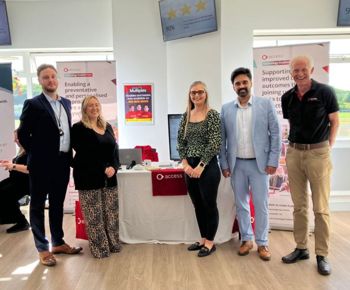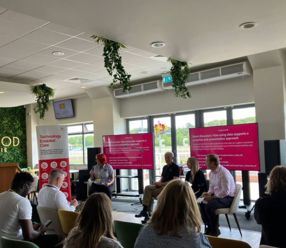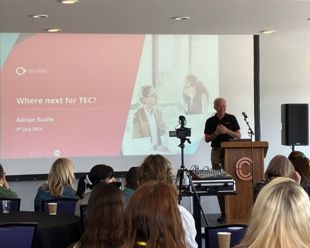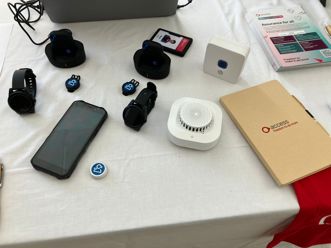
Innovative Use of Technology Enabled Care
The Essex TEC Showcase highlighted the significant steps made implementing Technology Enabled Care (TEC) across Essex. The opening talk set the tone for the day, with speakers Moira McGrath, Lee Cox-Davies, Andrew Quigley, and Natasha Corness underscoring the commitment and passion driving TEC innovation in the region. With over 400 attendees, the event aimed to showcase the prescriber-led approach to TEC and its significant impact on individuals' lives, enabling them to live more independently and on their own terms.
Essex County Council demonstrated its robust commitment to TEC, seeing approximately £1 million in avoidable savings per month and benefiting 10,133 individuals over the past three years. With the majority of individuals benefitting being around 78 years old, they highlighted how TEC supports people of all ages.
They explained how the Council has trained over 2,000 individuals, responded to 5,000 visits, and managed over 500 pieces of care technology equipment. The embedded social value of nearly £17 million across TEC procurement over the past three years highlights the multifaceted benefits, including training, employment, and climate impact their TEC projects have had across Essex.
Lee Cox-Davies, Managing Director of Livity Life, emphasised the importance of personalised care in partnership with local authorities and NHS trusts to achieve the best outcomes for personal lives. Andrew Quigley spoke about the role of social enterprise and community interest in extending the TEC agenda, noting the high engagement and the focus on supporting younger individuals with learning disabilities and autism to maintain their independence.
Empowering Start-Ups Through the Essex Care Technology Challenge Prize
One of the most interesting talks of the day showcased the success of Essex’s Challenge Prize Fund, which aimed to support smaller start-up companies incorporating TEC into their solutions to help grow their businesses.
Led by Jack Daniels from Essex County Council, he explained how The Challenge Prize was designed to help put TEC into practice, and has been instrumental in supporting the over 38,000 care workers in Essex and the delivery of over 6 million care packages annually.
This initiative provided a collaborative environment to improve outcomes for individuals, families, the economy, and the health and social care sectors. The 8-10 week program allowed start-ups to interact with various stakeholders, build their businesses, and make innovative changes.
Rachael Malthouse from Spectrum Tailored Technologies, who has an autistic child, developed a digital tool to empower autistic children and assist parents with healthcare advice. Her tool, which includes features like virtual wardrobes to help make daily tasks more engaging, has been tested with over 200 autistic children. Rachael's next steps include launching the product in September, seeking further grants, and expanding partnerships with institutions like Anglia Ruskin and Plymouth University.
James Brown and Matt Ash from Supersense Technologies, who volunteer at mental health and dementia charities, created a TEC solution to support individuals living with dementia. Their pilot focuses on enhancing quality of life through better activity monitoring and using natural language prompts. They aim to incorporate AI, VR, and robotics to further improve their solution.
Both Rachael, James, and Matt highlighted that innovation in TEC is driven by personal experiences and the need to solve real-life problems.
Proactive and Preventative Care Through Data Utilisation

A key topic of the day was addressing the best ways to deliver better preventative and proactive care to move away from relying on being reactive.
Here the first-panel discussion of the day, chaired by Deb Knowles, included multiple panelists with our very own Adrian Scaife to delve into how data-driven approaches can revolutionise care deliveries.
The discussion emphasized the shift towards outcomes-based care, moving away from reactive scheduling of care hours to a more nuanced understanding of individuals' needs.
Through explaining the benefits of proactive and preventative care, the panel discussion highlighted that it involves identifying subtle changes in wellbeing, nutrition, and daily behaviours to prevent agitation and critical situations from occurring. The combination of machine learning and human insight helps to better understand activity, preferences, and daily needs, offering independence and reassurance to those receiving care.
The panelists agreed that larger datasets will be crucial in moving towards more predictive care models as this data-driven approach will help create a richer picture of care, enabling early interventions and improving overall care outcomes.
The Evolution and Future of TEC

As well as participating in a panel discussion, our very own Adrian Scaife provided a comprehensive, engaging, and informative presentation on the evolution of TEC. Here Adrian highlighted the key drivers for change, including the need for person-centred care, a focus on outcomes, increasing home care, community power, and digital transformation.
By explaining the TAPPI’s 10 principles of co-production, Adrian highlighted the benefits of co-production and TEC for effective usage and better outcomes.
It was also explained that effective digital transformation strategies enable more personalised and efficient care to move away from traditional, reactive models. Here by explaining as we are approaching the 4th generation of telecare, Adrian demonstrated that by embracing digital tools, care providers can deliver better outcomes, avoid crises, and create a more integrated service. The integration of insights and data from TEC was explained to show how it helps improve quality, safety, and efficiency, offering a new value to services to better support the capacity of care networks and independent living.

One significant example of how integration with TEC improves care deliveries further is through using technology to integrate data from TEC and care planning software together to allow for more timely interventions and enable better preventative measures. At Access TEC we are already making that step of integrating solutions by integrating our TEC products with our Access Care Planning software, for more information contact us today and we can show you first-hand how it works and the benefits it provides for care providers, care workers, and the wider care circle.
Digital Switchover and Its Implications for Care
A topic that most attendees were interested in listening to and asking about was the digital switchover, how to do it, best practices, and what announcements of a delayed deadline really means.
Mark Williams from the Local Government Association outlined the steps councils need to take to prepare for this change, including audits, impact assessments, risk management, and communication strategies to ensure the transition from analogue to digital is completed by 2027 seamlessly.
Mark addressed that the switchover will affect approximately 1.8 million telecare users, requiring coordination across IT, transformation, and security to avoid indirect impacts. He stated that Councils must understand who needs support, communicate effectively, and manage the risks associated with the transition.
Acknowledging that this isn’t an easy process, Mark showcased that the LGA has developed a range of tools and resources, including data-sharing agreements, communication toolkits, and scam guidance, to assist with the switchover process.
To enable a successful switchover, it was highlighted that understanding the telecare user base is crucial, particularly regarding issues with GDPR and standardised data. Here Mark showed that the LGA's supported documentation outlines 10 key steps for a successful digital switchover, emphasising the power of co-production and stakeholder engagement.
To conclude the insightful talk on best practices with the digital switchover, Mark summarised the importance of doing right and being strategic so proactive measures, such as fall prevention and scam awareness can help enable a smooth transition and prevent digital exclusion.
Livity Life Strategy and Essex County Council Innovation Showcase
One of the final parts and themes of the day was showcasing what Essex County Council’s partnership with Livity Life has enabled for individuals across the county.
Here this presentation demonstrated the progress they have made over the past three years as well as the outlined plans for the next four. Here they showed this partnership with Essex County Council has led to significant improvements in care delivery, including a 17% reduction in care packages, less avoidable care, and £14 million in system-wide savings. Their focus on shared experiences and lived insights showed how it has helped to embed person-centered care and foster stronger transformation partnerships.
Their strategy of emphasising the importance of data-led services, which track health and wellbeing without the need for hospital visits, showed how it prevents vulnerability, offers clinically led care, and creates system-wide savings through social care provider collaborations. Their data insights have driven proactive services, reducing reactionary health and social care interventions to change the norm for care delivery for the better.
The Essex County Council Innovation Showcase, presented by Natasha Corness, demonstrated their success and next steps further by highlighting various pilots using TEC to improve service accessibility and quality.
The Anthropos Reablement Pilot in North Essex, a six-month initiative, focuses on activity monitoring to make better care decisions post-discharge. This pilot aims to reduce hospital stays and improve reablement outcomes.
Another pilot, Hospital Roles with TEC, aims to integrate TEC into hospital discharge processes, reducing delays, preventing readmissions, and supporting training initiatives. By embedding TEC liaison officers within hospitals, the project seeks to educate and raise awareness about the benefits of TEC in care pathways.
The predictive analysis pilot uses data to better understand the needs of Essex residents, matching reviews to assessments and targeting interventions more effectively. This data-driven approach helps to identify early adopters and long-term beneficiaries, improving the efficiency and effectiveness of care delivery.
Next Steps – How can TEC be embedded to improve care outcomes?
It is clear the future of TEC in Essex is promising as they continue with their success of embedding TEC and care technologies throughout the county. With further plans to expand and use larger datasets to target interventions and support more specifically to cater to the changing needs of each individual, a lot can be learned by their strategies in leveraging data and technology to improve outcomes.
We thoroughly enjoyed being invited to attend the Essex TEC Showcase and be able to speak to like-minded stakeholders on the power of technology enabled care for everyone involved. It is clear to achieve these goals, investment in TEC is vital, along with continued collaboration and partnerships across sectors.
The Essex TEC Showcase highlighted the transformative potential of TEC in care deliveries. From empowering start-ups to leveraging data for proactive care, improving community housing, and navigating the digital switchover, the event showcased a future where technology and care are seamlessly integrating to improve outcomes for all.
At Access TEC, we know and believe this strategy is also true. Our full-service social alarm ecosystem focuses on supporting individuals to accelerate care provision in two ways: allow the care location to happen whenever and wherever, as well as create preventative and personalised care to maintain independent living.
As we continue heading into the 4th generation of telecare, we aim to join technology and people together to empower preventative and proactive care. Our latest integration with our care planning software demonstrates the steps we are taking to transform the TEC space for the better.
Here this integration allows care workers full visibility of smart alerts and alarms from our Access Assure Home Hub into our care planning mobile app so all the information needed is in one place to make better timely data-led decisions, reduce risks, and identify issues before something more critical takes place.
For more information on how Access TEC increases independence, provides reassurance, and turns data into actionable insights, contact us today. For an in-depth exploration of how Technology Enabled Care can benefit you, we invite you to explore some examples here.
Let's start your TEC journey now to improve outcomes for all, enable a seamless digital switchover, and most importantly the quality of life for end-users.

 AU & NZ
AU & NZ
 SG
SG
 MY
MY
 US
US
 IE
IE
